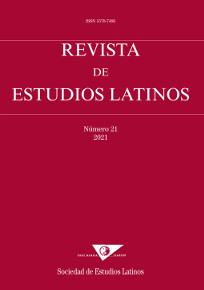The way towards the textual model of the Libro de las cuatro virtudes by Alfonso de Cartagena: the late manuscripts of the Formula uitae honestae
DOI:
https://doi.org/10.23808/rel.v21i21.92720Keywords:
Textual tradition; manuscript transmission; Libro de las cuatro virtudes, Formula uitae honestae; Alfonso de Cartagena; Martinus Bracarensis.Abstract
The Formula uitae honestae by Martín de Braga had a very extensive manuscript tradition throughout the whole European territory and has several translations into vernacular languages. One such a translation is the Spanish one made by Alfonso de Cartagena in the fifteenth century, which derives from the version of the work that bore the title De quattuor uirtutibus and was wrongly assigned to Seneca, which was transmitted
extensively from the twelfth century onwards, and especially during the fourteenth and fifteenth centuries. This paper presents a textual analysis of the fourteenth-century manuscripts preserved in Spanish and French libraries and a study of the miscellanies they contain and their format, which seek to account for the importance of these testimonies for the reception of the Latin work and therefore for the model that Alfonso de Cartagena could use for his translation, which is entitled Libro de las cuatro virtudes and included among the texts known as the Tratados de Séneca.
Downloads
References
Blüher, K. A. (1983): Séneca en España. Investigaciones sobre la recepción de Séneca en España desde el siglo XIII hasta el siglo XVII, Madrid, Gredos (original en 1969: Seneca in Spanien. Untersuchungen zur Geschichte der Seneca-Rezeption in Spanien vom 13. bis zum 17. Jahrhundert, Múnich, A. Francke).
Faucon, M. (1969 reimp.): La Librairie des Papes d’Avignon, sa formation, sa composition, ses catalogues, 1316-1420. D’après les registres de comptes et d’inventaires des archives vaticanes, Ámsterdam, Gérard Th. Van Heusden, I-II (original en París, Bibliothèque des Écoles Françaises d’Athènes et de Rome, 1886-1887 [Fascicules 43, 50]).
Fernández Gallardo, L. (2002): «Latín y vulgar. Ideas sobre la lengua en la Castilla del siglo xv», Revista de Poética Medieval, 8, 11-76.
Fernández Gallardo, L. (2012): La obra literaria de Alonso de Cartagena (1385-1456). Ensayo de historia cultural, Sarrebruck, Editorial Académica Española.
Fontán, A. (1949): «Algunos códices de Séneca en bibliotecas españolas y su lugar en la tradición de los diálogos», Emérita, 17, 9-41.
Lawrance, J. (1990): «Humanism in the Iberian Peninsula», en Goodman, A. & MacKay, A. (eds.), The Impact of Humanism in Western Europe, Londres, Longman, 220-258.
Olivetto, G. (2011): ‘Título de la amistança’. Traducción de Alonso de Cartagena sobre la ‘Tabulatio et expositio Seneca’ de Luca Mannelli, San Millán de la Cogolla, Cilengua.
Ranero Riestra, L. (2021): La ‘Formula uitae honestae’ de Martín de Braga y el ‘Libro de las cuatro virtudes’ de Alfonso de Cartagena. Edición y estudio, Pisa, Pacini Editore (Biblioteca Degli Studi Mediolatini e Volgari. Nuova serie XXIII).
Ranero Riestra, L. (2021a): «La tradición latina de la Formula uitae honestae de Martín de Braga en la traducción de Alfonso de Cartagena. Una aproximación sobre su tradición textual», en Codoñer, C., Andrés Sanz, Mª. A., Martín-Iglesias, J. C. & Paniagua, D. (eds.), Nuevos Estudios de Latín Medieval Hispánico, Florencia, SISMEL-Edizioni del Galluzzo (mediEVI, 31), 369-378.
Ranero Riestra, L., y Valero Moreno, J. M., (2019), eds.: Alfonso de Cartagena, Cinco libros de Séneca, Salamanca, IEMYRhd & SEMYR (serie Biblioteca Cartagena).
Ruiz García, E. (2004): «En torno a los romanceamientos de Séneca en el Cuatrocientos», en De Robertis, T. & Resta, G. (eds.), Seneca: una vicenda testuale (Mostra di manoscritti ed edizioni. Firenze, Biblioteca Medicea Laurenziana, 2 aprile - 2 luglio 2004), Florencia, Mandragora, 65-82.
Valero Moreno, J. M. (2012): «Las Artes liberales de Alonso de Cartagena: los manuscritos salmantinos y el tipo α», en Modelos intelectuales, nuevos textos y nuevos lectores en el siglo XV. Contextos literarios, cortesanos y administrativos. Primera entrega, Salamanca, SEMYR – LaSEMYR (serie Documenta, 4), 135-213.
Downloads
Published
How to Cite
Issue
Section
License
Copyright (c) 2021 Revista de Estudios Latinos

This work is licensed under a Creative Commons Attribution-NonCommercial-NoDerivatives 4.0 International License.
The originals published in the printed and electronic editions of this journal are the property of the Revista de Estudios Latinos and can be circulated as long as the original source and authorship is made clear in any reproduction, full or partial, of the same, and as long as this is not done for commercial purposes.






